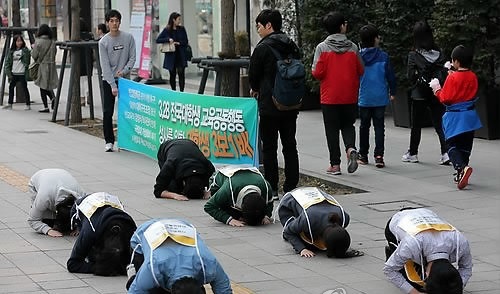At the turn of the month, Koreans braced for the beginning of another vacation season to cool off from the blazing heat of summer. But that luxury was largely deprived from many college students entrusted with the tall task of earning money to cover sky-high tuition fees before a new semester begins in September.
“I have part-time jobs, but they barely pay for the housing and other living expenses,” said a 22-year-old student attending Yonsei University. “Right now, I’m getting student loans, but I don’t know how I will pay them back with jobs being so hard to find.”
Data from the Organization of Economic Cooperation and Development showed that the college tuition in Korea was the fourth highest among OCED countries in 2013 in relation to purchasing power.
“I have part-time jobs, but they barely pay for the housing and other living expenses,” said a 22-year-old student attending Yonsei University. “Right now, I’m getting student loans, but I don’t know how I will pay them back with jobs being so hard to find.”
Data from the Organization of Economic Cooperation and Development showed that the college tuition in Korea was the fourth highest among OCED countries in 2013 in relation to purchasing power.

With over 70 percent of high school graduates going to college, more and more students and their families have been saddled with a large financial burden due to education.
The average college tuition in Korea surged throughout the 2000s with growth peaking at 10 percent in 2006.
As a result, most students graduate in debt. Seven out of 10 college graduates have received student loans for an average 14.45 million won ($13,900), according to a survey by a job information portal Saramin.
It then takes them about four years to amortize the principal and interest, which generally has a negative effect upon their careers.
Around 45.5 percent of recent grads said they applied to “whatever job that was available” to make money as soon as possible and 17.2 percent said they had to take part-time jobs which hindered their job-seeking process.
According to the Education Ministry, the financial difficulties stemming from the burden of college tuition was the biggest cause of suicide attempts among college students.
Since 2007, the government has worked to curb the exponential rise of tuition fees, which has had limited effects. Data from the Education Ministry showed that the average tuition in 2013 was 6.67 million won per semester, a hair less than 6.7 won the year before.
While Korean colleges are not the priciest in the world ― private colleges in the United States charged about $29,000 per annum in 2012-2013 ― they are the schools most heavily dependent on money from students.
According to Organization of Economic Cooperation and Development, Korea spends about 2.6 percent of its GDP on tertiary education, and public funding only accounts for 26.9 percent of it. It had the highest ratio of private spending compared to total education expenditure out of all OECD countries.
Even in the U.S. the public expenditure was about 35.7 percent of the total spending.
“Countries like the U.S. have more public colleges and more scholarship programs than in Korea. This means the pain inflicted upon Korean students is more than what the numbers suggest, said Park Geo-yong, a professor of English education at Sangmyung University and the author of the book “A Country of Insane Tuition Fees.”
The percentage of Korean students attending private colleges was at 82 percent, said officials at the Korea Higher Education Research Institute. Park said Korea needs to increase the number of openings at state-run universities, which have tuition that is a little more than half that at private institutes.
Some experts said boosting government support is key to ultimately subdue the continuous rise in college tuition fees.
“The quality of education in Korean colleges is not very high. The government should not constrict investment in colleges. Instead, it should expand scholarship programs and double funding for colleges,” Lee Tae-eog, a professor at the Korea Advanced Institute of Science and Technology told the local media.
By Yoon Min-sik (minsikyoon@heraldcorp.com)








![[KH Explains] Hyundai's full hybrid edge to pay off amid slow transition to pure EVs](http://res.heraldm.com/phpwas/restmb_idxmake.php?idx=644&simg=/content/image/2024/04/18/20240418050645_0.jpg&u=20240419100350)







![[From the Scene] Monks, Buddhists hail return of remains of Buddhas](http://res.heraldm.com/phpwas/restmb_idxmake.php?idx=652&simg=/content/image/2024/04/19/20240419050617_0.jpg&u=20240419175937)

![[KH Explains] Hyundai's full hybrid edge to pay off amid slow transition to pure EVs](http://res.heraldm.com/phpwas/restmb_idxmake.php?idx=652&simg=/content/image/2024/04/18/20240418050645_0.jpg&u=20240419100350)

![[Today’s K-pop] Illit drops debut single remix](http://res.heraldm.com/phpwas/restmb_idxmake.php?idx=642&simg=/content/image/2024/04/19/20240419050612_0.jpg&u=)